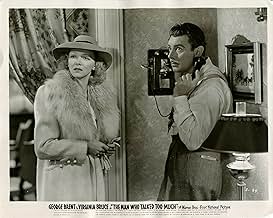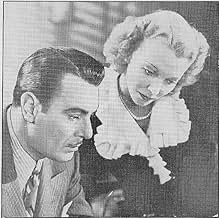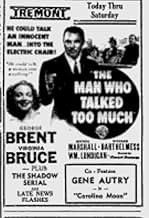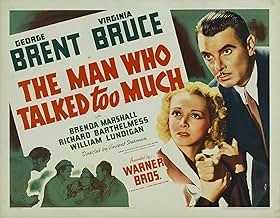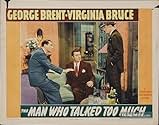NOTE IMDb
6,3/10
422
MA NOTE
Ajouter une intrigue dans votre langueA DA quits after wrongly convicting an innocent man. His secretary joins his new law firm, which prospers through mob ties. His brother John joins but discovers corruption and helps the feds... Tout lireA DA quits after wrongly convicting an innocent man. His secretary joins his new law firm, which prospers through mob ties. His brother John joins but discovers corruption and helps the feds, leading to his own false murder conviction.A DA quits after wrongly convicting an innocent man. His secretary joins his new law firm, which prospers through mob ties. His brother John joins but discovers corruption and helps the feds, leading to his own false murder conviction.
- Réalisation
- Scénario
- Casting principal
Edwin Stanley
- District Attorney Nelson
- (as Ed Stanley)
Kay Sutton
- Mrs. Knight
- (scènes coupées)
Avis à la une
The Man Who Talked Too Much presumably refers to George Brent, who plays a district attorney who sends an innocent man to the death house. To compensate for his mistake he becomes a struggling defense lawyer, eventually taking on some nasty gangland types in order to make ends meet. The film starts in terrific fashion and is well acted and written throughout, but it eventually bogs down into a standard 'B' plot of frame-ups and revenge. Nevertheless I recommend this to anyone interested in second features, and it certainly has the grit one expects of Warner crime films. Watch for Marc Lawrence in one of his patented bad guy roles.
Brilliant ADA Stephen M. Forbes (George Brent) gets an innocent man executed. In frustration, he quits to work for the innocent. Only it doesn't pay well. That when gangster Roscoe recruits Steve to be a mob lawyer. He uses the money to put his younger brother Johnny through law school.
I saw the punch coming a mile away and the KO really bugged me. I can take a bit of artistic license, but I can't take that. The stunts are too outrageous. This is based on a play and is the second adaptation. While I can accept the premise as written, it feels constructed. Mostly, I don't like Steve turning into a mob lawyer that quick. Maybe he could defend Roscoe first without agreeing to defend all his friends. This deals with a real lawyer issue, but does it in a rather ham-fisted way. This is borderline fine.
I saw the punch coming a mile away and the KO really bugged me. I can take a bit of artistic license, but I can't take that. The stunts are too outrageous. This is based on a play and is the second adaptation. While I can accept the premise as written, it feels constructed. Mostly, I don't like Steve turning into a mob lawyer that quick. Maybe he could defend Roscoe first without agreeing to defend all his friends. This deals with a real lawyer issue, but does it in a rather ham-fisted way. This is borderline fine.
I nearly always prefer watching the original film and not remakes. Yet somehow, I have managed to watch both remakes ("The Man Who Talked Too Much" and "Illegal") without yet seeing the first film ("The Mouthpiece")--so I can't really compare the remakes with the original. But, in nearly every case, I do prefer original films and I must knock a point off "The Man Who Talked Too Much" for being a remake.
Of the three leads from these three films, George Brent in "The Man Who Talked Too Much" is probably the most poorly cast. While a fine actor, it is harder to imagine him playing a rather crooked individual--whereas Warren William and Edward G. Robinson are a bit more at home with such roles. Also, I will admit it up front that the plot is really hard to believe. So, to enjoy the film you just have to accept that Brent could be bad and the rest of the plot. If you can't, the film just won't work very well.
The film begins with Brent playing a prosecuting attorney, Stephen Forbes. He convicts a man for murder and is quite pleased with himself--until they learn he was innocent. To make things worse (and HIGHLY contrived), they find out only seconds before the execution and they cannot reach the warden in time to stop it! Forbes is horrified and quits his job--which isn't too surprising. Now in private practice, he has a hard time making ends meet. But, when mobsters find out how talented he is, he immediately becomes a success--to the horror of his younger and very idealistic brother. What follows is amazingly contrived (you just have to see it) but also enjoyable in a brainless sort of way. Not a bad film--but one that could have been better.
UPDATE: I finally got to see the original version, "The Mouthpiece". It's significantly better...and a lot racier!
Of the three leads from these three films, George Brent in "The Man Who Talked Too Much" is probably the most poorly cast. While a fine actor, it is harder to imagine him playing a rather crooked individual--whereas Warren William and Edward G. Robinson are a bit more at home with such roles. Also, I will admit it up front that the plot is really hard to believe. So, to enjoy the film you just have to accept that Brent could be bad and the rest of the plot. If you can't, the film just won't work very well.
The film begins with Brent playing a prosecuting attorney, Stephen Forbes. He convicts a man for murder and is quite pleased with himself--until they learn he was innocent. To make things worse (and HIGHLY contrived), they find out only seconds before the execution and they cannot reach the warden in time to stop it! Forbes is horrified and quits his job--which isn't too surprising. Now in private practice, he has a hard time making ends meet. But, when mobsters find out how talented he is, he immediately becomes a success--to the horror of his younger and very idealistic brother. What follows is amazingly contrived (you just have to see it) but also enjoyable in a brainless sort of way. Not a bad film--but one that could have been better.
UPDATE: I finally got to see the original version, "The Mouthpiece". It's significantly better...and a lot racier!
This opens with lawyer George Brent probing a man guilty in court. The guy is sent to prison and is readied for the electric chair. New evidence comes to light: He is innocent. There are frantic attempts to reach the warden. But they;re unsuccessful. An innocent man has been killed as we watch the flicker of the chair.
This all happens in the first few minutes. It's giving nothing away. The rest of the movie involves Brent's deciding to make some money and starting to defend shady characters. His loyal secretary Virginia Bruce goes with him. (What a beauty she was! Such a haunting look.) His brother William Lundigan has graduated from law school. Etc. Brenda Marshall has too small a role. It hops the track but in some ways is an early noir.
This all happens in the first few minutes. It's giving nothing away. The rest of the movie involves Brent's deciding to make some money and starting to defend shady characters. His loyal secretary Virginia Bruce goes with him. (What a beauty she was! Such a haunting look.) His brother William Lundigan has graduated from law school. Etc. Brenda Marshall has too small a role. It hops the track but in some ways is an early noir.
As much as Americans express pride in their political and legal system, it is also true that they hold politicians and attorneys in very low esteem. The popular perception of lawyers as unethical and devious is not new and here it permeates this modest 1940 feature. What George Brent does on the screen has little connection to reality (there is one particularly silly scene in which he grandstands by ingesting poison during a murder trial), but sets the stage for his reformation and a happy ending.
The movie flies by so it may be worth 76 minutes of a viewer's time as a reminder of Hollywood's long-standing tradition of disparaging the legal profession.
The movie flies by so it may be worth 76 minutes of a viewer's time as a reminder of Hollywood's long-standing tradition of disparaging the legal profession.
Le saviez-vous
- AnecdotesFrank J. Collins based his protagonist on Manhattan defense attorney William Joseph Fallon, dubbed "The Great Mouthpiece" by the 1920's New York press, who had a short but spectacularly successful career before succumbing to the effects of his own dissoluteness at the age of 41.
He has been cited as one of the inspirations for the celebrity lawyer Billy Flynn in the popular musical Chicago. He is also portrayed for six episodes by David Aaron Baker in the HBO television series Boardwalk Empire (2010).
- ConnexionsReferences Vingt mille ans sous les verrous (1932)
Meilleurs choix
Connectez-vous pour évaluer et suivre la liste de favoris afin de recevoir des recommandations personnalisées
Détails
- Date de sortie
- Pays d’origine
- Langue
- Aussi connu sous le nom de
- El que habló demasiado
- Lieux de tournage
- Société de production
- Voir plus de crédits d'entreprise sur IMDbPro
- Durée1 heure 16 minutes
- Couleur
- Rapport de forme
- 1.37 : 1
Contribuer à cette page
Suggérer une modification ou ajouter du contenu manquant

Lacune principale
By what name was L'homme qui parlait trop (1940) officially released in India in English?
Répondre


